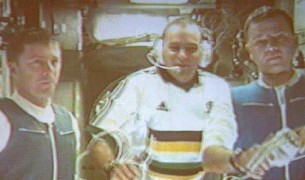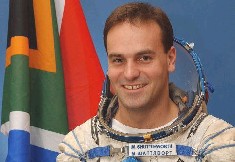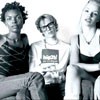SA's 'Afronaut' back on Earth
6 May 2002
South African Mark Shuttleworth ended his 10-day space journey on Sunday as the Soyuz capsule, charred from its fiery re-entry into the Earth's atmosphere, touched down safely under bright blue skies near the town of Arkalyk in Kazhakstan.
Shuttleworth says he'll never forget the trip; to make sure, he's bought the spacesuit he travelled in - and is planning to show SA schoolkids a specially made replica of the Soyuz capsule when he tours the country's schools in the coming weeks.
Shuttleworth had a busy eight days aboard the International Space Station: checking equipment, conducting scientific experiments, photographing key ecological areas on the Earth, and inspiring South African schoolchildren with regular live conversations via HAM radio. He even fitted in chats with Nelson Mandela and President Thabo Mbeki.
Shuttleworth became the first African in space when he blasted off from the Baikonur Cosmodrome in Kazhakstan on April 25 with veteran Russian cosmonaut Yuri Gidzenko and Italian Roberto Vittori aboard the Soyuz rocket. On May 5, his dream trip to space came to an end.
But not before he'd wrapped up his work on a series of experiments - including the first experiment in the world to assess the impact of zero-gravity on the development of stem cells and embryos - and held his final extra-planetary Q and A session, this time with underprivileged kids from Khayelitsha near Cape Town.
Shuttleworth's fare for the trip was reportedly in the region of the US$20-million that American Dennis Tito paid to become the world's first "space tourist" in 2001.
However, Shuttleworth went through seven months of cosmonaut training and was a fully certified member of the Soyuz crew with responsibility for some of the spacecraft's functions.

Shuttleworth, wearing a Bafana Bafana jersey,
speaks to President Thabo Mbeki during a live video satellite link-up on April 27. To his right is Russian flight commander Yuri Gidzenko. (Photo: First African in Space Project)
He also conducted a number of experiments designed by South African scientists, making previously inaccessible space research available to the African scientific community.
And on the ground, the First African in Space Project set up by Shuttleworth used his trip as a springboard for an educational outreach programme aimed at encouraging South African schoolchildren to embrace mathematics and science.
Chatting with Mbeki, Mandela
On 27 April, Shuttleworth spoke to President Thabo Mbeki, who was celebrating Freedom Day in Bloemfontein, via a live satellite link-up just hours after Soyuz had docked with the International Space Station.
Mbeki opened the 10-minute conversation with: "Yes, ambassador, how are you?" He went on to praise the first African in space for his contributions to science and the African Renaissance.
Shuttleworth commented on the beautiful sunset and sunrise he had seen over Africa, telling the President that he had "never seen anything as beautiful as Earth from space". Mbeki asked him to bring pictures, "so that we can know what we look like to you from up there".
On May 2, another satellite link-up saw Shuttleworth in conversation with Mandela, who said the Space Station had done much to unite the Earth's nations. "The International Space Station is a wonderful example of co-operation among nations, all of whom have the future of the planet at heart", Mandela said. "More and more we realise that we are interlinked, we are all interdependent."
When Mandela asked Shuttleworth what horizon he would be looking at upon his return home, Shuttleworth answered: "There is much work to be done [in Africa], but I also have much hope for the future … Madiba, you know better than any of us that life has an amazing way of throwing challenges at us … It is difficult to say what could be more challenging than this, but I am sure that life will have something special in store … and I must be ready to take it on when it comes."
Internet entrepreneur
Born in Welkom in 1973 and raised in Cape Town, Shuttleworth launched an internet consultancy from his parent's garage in 1996. Four years later, at the age of 26, he sold his company for US$575-million.
Since then he has launched HBD ("Here Be Dragons"), a venture-capital company seeking to invest in innovative technology companies that are based in South Africa but have the potential to serve a global marketplace, as well as The Shuttleworth Foundation, a non-profit organisation focused on innovation in African education.
In 1991, Shuttleworth was appointed a member of the high-level advisory commission set up by President Thabo Mbeki, the International Advisory Council on Information Society and Development. He also funds and serves on the board of bridges.org, an international non-profit organisation that seeks to address digital divide issues through both grass-roots work and high-level policy dialogue.
SouthAfrica.info reporter
|








 Facebook
Facebook Twitter
Twitter Mobile
Mobile RSS feeds
RSS feeds Newsletter
Newsletter Weblines
Weblines